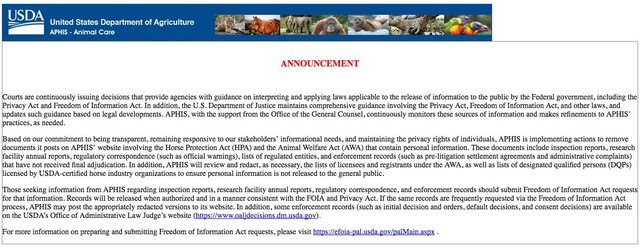The fight to save dogs and puppies in puppy mills just suffered a major setback, after information relating to the Animal Welfare Act (AWA) previously made available online disappeared from a government site on Friday.
Inspections reports from the U.S. Department of Agriculture (USDA) – the government agency that oversees enforcing the AWA – are no longer readily available to the public. These reports detail infractions against animal welfare at all kinds of facilities – including puppy mills, zoos and circuses – and they have been available for over a decade.

People who advocate for the better treatment of puppies and dogs in puppy mills are deeply concerned about how this will impact their work to make canine lives better. And some are already planning ways to resist the order.
New Jersey “will counter the USDA info blackout by prohibiting any pet store from sourcing a pet unless the breeder waives its ‘so called’ right of privacy and has its inspection reports on the USDA website,” New Jersey Senator Raymond Lesniak, who has been working to crack down on inhumane puppy mills supplying dogs to New Jersey pet shops, told The Dodo.
While the USDA will continue its inspections of facilities across the country, people are worried that because of this new policy, the public may never know what inspectors find.
This means that the squalid living conditions for mother dogs and puppies at massive breeders may never come to light.

“We’ve been the USDA’s watchdog for 20 years,” Deborah Howard, president of Companion Animal Protection Society (CAPS), told The Dodo. CAPS actually sends investigators into these breeding facilities and keeps an eye on what the USDA is reporting. “One way we use inspection reports is so that we can monitor USDA inspections.”

In some places, like New York, pet stores are required to provide the inspection reports to people who buy their dogs and puppies, Howard said. Now it’s unclear if this will be possible.
“We also use the USDA reports to show which pet shops are using puppy mills,” Howard said. “They put the reports online under Obama and it’s been very useful for everybody. We compare our findings to the inspectors. If we didn’t have those reports, we wouldn’t be able to do our inspections.”

Now, if people want to have the information about large puppy breeders – along with any other kind of facility that uses animals and is under the USDA – they will have to issue a request through the Freedom of Information Act (FOIA), which could involve lengthy waits. Howard, in her two decades of this work, has experienced what it was like to file requests for this information in the past. Sometimes, it took a year and a half to get the documents she needed. Other times “it took so long, we eventually gave up,” Howard said.
For reporters concerned with animal welfare, for example, this makes any reporting on animal mistreatment at some 9,000 facilities overseen by the USDA much harder. (After The Dodo published a report about the removal of the documents, the USDA’s alternative twitter account tweeted The Dodo’s coverage).
Here’s the @Dodo‘s report on the Trump USDA’s shocking assault on #transparency https://t.co/I20Nxzcstl #factsmatter #animalwelfare #resist
— AltUSDA (@altusda) February 3, 2017
“All information was removed today. This includes inspection reports for breeders, exhibitors and research facilities,” Tanya Espinosa, public affairs specialist for legislative and public affairs at USDA-APHIS, told The Dodo on Friday.
In the announcement on the page where these records were once accessible, the USDA said the decision was “based on our commitment to being transparent … and maintaining the privacy rights of individuals.” Some observed that very little information about individuals was ever disclosed on these reports.
The review of APHIS’ website has been ongoing, and the agency is striving to balance the need for transparency with rules protecting individual privacy. In 2016, well before the change of Administration, APHIS decided to make adjustments to the posting of regulatory records. In addition, APHIS is currently involved in litigation concerning, among other issues, information posted on the agency’s website. While the agency is vigorously defending against this litigation, in an abundance of caution, the agency is taking additional measures to protect individual privacy. These decisions are not final. Adjustments may be made regarding information appropriate for release and posting.





